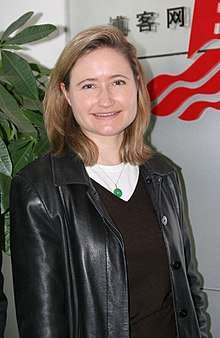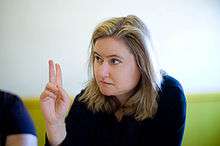Rebecca MacKinnon
Rebecca MacKinnon (born September 16, 1969) is an author, researcher, Internet freedom advocate, and co-founder of the citizen media network Global Voices. She is notable as a former CNN journalist who headed the CNN bureaus in Beijing and later in Tokyo. She is on the Board of Directors of the Committee to Protect Journalists,[1] a founding board member of the Global Network Initiative[2] and is currently director of the Ranking Digital Rights project at the New America Foundation's Open Technology Institute.
Rebecca MacKinnon | |
|---|---|
 MacKinnon in Beijing, 2005 | |
| Born | September 16, 1969 Berkeley, California, U.S. |
| Alma mater | Harvard University (1991) |
| Occupation | journalist, author, researcher |
Early life and education
.jpg)
MacKinnon was born in Berkeley, California. When she was three years old, MacKinnon's family moved to Tempe, Arizona, where her father Stephen R. MacKinnon took a job as Professor of Chinese History at Arizona State University. Her parents' academic research careers led her to pass most of her primary school years in Delhi, India, Hong Kong, and Beijing, China, before moving back to Arizona for middle and high school. She graduated from Tempe High in 1987.
She graduated magna cum laude from Harvard University in 1991 with a B.A. in Government. After graduating, she served as a Fulbright scholar in Taiwan, where she also worked as a Newsweek stringer.
Career
CNN
MacKinnon joined CNN in 1992 as Beijing Bureau Assistant and moved up to Producer/Correspondent by 1997 and Bureau Chief by 1998.[3] In 2001 she became Tokyo Bureau Chief. During her time with CNN, she interviewed notable leaders including Junichiro Koizumi, Dalai Lama, Pervez Musharraf, and Mohammad Khatami.
Fellowships

In the spring of 2004, MacKinnon was a fellow of the Joan Shorenstein Center on the Press, Politics and Public Policy at Harvard's Kennedy School of Government.[4] That summer, she joined Harvard Law School's Berkman Center for Internet & Society as a Research Fellow, where she remained until December 2006.[5] Among her projects at the Berkman Center, MacKinnon founded Global Voices Online in collaboration with Ethan Zuckerman.[6]
In January 2007 she joined the Journalism and Media Studies Center at the University of Hong Kong, where she remained until January 2009.[7] From February 2009 to January 2010, she conducted research as an Open Society Fellow, funded by George Soros' Open Society Institute.[8] Then in February 2010 she joined Princeton University's Center for Information Technology Policy where she is a visiting fellow, working on a book about the future of freedom in the Internet age.[9] Regarding the Middle East, MacKinnon wrote that "the Internet empowers people and helps to bring about the peaceful changes associated with the Arab Spring".[10]
In September 2010, MacKinnon became a Bernard L. Schwartz fellow at the New America Foundation.[11] She is currently Director of the think tank's Ranking Digital Rights project developing a methodology to rank Internet, telecommunications, and other ICT sector companies on free expression and privacy criteria.
In January 2007, she joined the inaugural Wikimedia Foundation Advisory Board.
Consent of the Networked
MacKinnon's first book, Consent of the Networked: The Worldwide Struggle For Internet Freedom, was published by Basic Books in January 2012 and won the Goldsmith Book Prize. In an interview, she said that she argues in the book (among other things) that:[12]
- We cannot assume that the Internet will evolve automatically in a direction that is going to be compatible with democracy. It depends on how the technology is structured, governed, and used. Governments and corporations are working actively to shape the Internet to fit their own needs. The most insidious situations arise when both government and corporations combine their efforts to exercise power over the same people at the same time, in largely unconstrained and unaccountable ways. This is why I argue that if we the people do not wake up and fight for the protection of our own rights and interests on the Internet, we should not be surprised to wake up one day to find that they have been programmed, legislated, and sold away.
References
- "Rebecca MacKinnon, Ahmed Rashid, and María Teresa Ronderos join CPJ board". Committee to Protect Journalists. Retrieved July 17, 2010.
- "Board of Directors". Global Network Initiative. Archived from the original on March 12, 2010. Retrieved July 17, 2010.
- "CNN Appoints Rebecca MacKinnon Beijing Bureau Chief". Time Warner. March 30, 1998. Retrieved July 17, 2010.
- "Spring 2004 Fellows – Joan Shorenstein Center on the Press, Politics and Public Policy". Hks.harvard.edu. Retrieved July 17, 2010.
- "Rebecca MacKinnon | Berkman Center". Cyber.law.harvard.edu. Retrieved July 17, 2010.
- Rebecca MacKinnon. "Global Voices in English » We are Global Voices. Five years on". Globalvoices.org. Retrieved July 17, 2010.
- "Journalism and Media Studies Centre, The University of Hong Kong – Rebecca MacKinnon". Jmsc.hku.hk. April 27, 2009. Archived from the original on September 21, 2009. Retrieved July 17, 2010.
- "Rebecca MacKinnon | Open Society Fellowship | Open Society Institute". Soros.org. Retrieved July 17, 2010.
- "Center for Information Technology Policy » Rebecca MacKinnon – Google, China, and Global Internet Freedom". Citp.princeton.edu. February 11, 2010. Archived from the original on March 8, 2010. Retrieved July 17, 2010.
- "Archived copy". Archived from the original on July 15, 2012. Retrieved September 15, 2012.CS1 maint: archived copy as title (link)
- "From her own blog".
- Rosen, Rebecca J. (February 14, 2012). "The Fight for a Fair and Free Internet". The Atlantic.
External links
| Wikimedia Commons has media related to Rebecca MacKinnon. |
Mackinnon's websites:
- RConversation (Rebecca MacKinnon's blog)
- Consent of the Networked (website for book)
Organizations:
- Committee to Protect Journalists
- Global Network Initiative
- Global Voices Online
- New America Foundation (2010-)
- Center for Information Technology Policy (2010)
- Open Society Fellowship (2009)
- Journalism and Media Studies Center at the University of Hong Kong (2007–2008)
- Berkman Center for Internet & Society (2004–2006)
- Rebecca MacKinnon at TED
